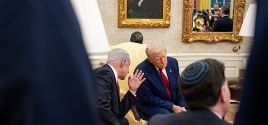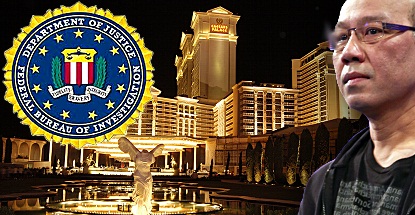FBI Agents Cut Internet Access, Pose As Repairmen To Perform Warrantless SearchThe government attempts to stretch the definition of "consent" to include deceptive tactics.Police State USA Oct. 30, 2014 |
Popular 
Eloy Adrian Camarillo, 17, Arrested in Shooting Death of Infowars Reporter Jamie White

NYT: Trump Ended War With Houthis After They Shot Down U.S. Drones, Nearly Hit Fighter Jets

Ben Shapiro, Mark Levin and Laura Loomer Warn of Foreign Influence... From Qatar

Trump Advisor to Washington Post: 'In MAGA, We Are Not Bibi Fans'

Trump Cut Off Contact With Netanyahu Over 'Manipulation' Concerns, Israeli Reporter Claims
  LAS VEGAS, NV — To investigate a purported case of untaxed sports betting, federal agents turned off internet access to three luxury hotel suites then impersonated repair technicians to covertly get inside and collect evidence. The FBI contends that this ploy is sufficient “consent” to perform warrantless searches in private residences. LAS VEGAS, NV — To investigate a purported case of untaxed sports betting, federal agents turned off internet access to three luxury hotel suites then impersonated repair technicians to covertly get inside and collect evidence. The FBI contends that this ploy is sufficient “consent” to perform warrantless searches in private residences.* * * * * In June 2014, the Federal Bureau of Investigation suspected that a wealthy Malaysian real estate developer and a few of his associates were betting on FIFA World Cup games. The bureau believed that 50-year-old Wei Seng “Paul” Phua and his son Darren Phua had accessed “online sports books” on their laptops as part of the unpermitted betting operation taking place at the Ceasar’s Palace Hotel and Casino. The FBI was in need of an articulate reason to acquire a warrant on the Phuas. To obtain one, agents devised a plan to sneak into three hotel suites masquerading as helpful computer technicians, arriving to solve a problem with the internet service. To create a disturbance, the scheme involved flickering the internet connection to the suspects’ villas over the course of two days, with the help of hotel computer contractors. Agents disguised as technicians responded to the villas with laptops to attempt to “fix” the problem. The plan was derailed when a butler refused to allow them to enter. “I just want to make sure they can connect before I leave,” one FBI agent said, his hidden camera revealed. “Can we just make sure they can connect, OK?” “The thing is, you can’t go in there right now,” the butler responded. Later, the internet connection was completely shut off and the faux technicians were poised to come and “fix” it. According to a lawsuit filed on behalf of Paul Phua, on June 22, 2014, agents then covertly searched the villas and took secret recordings — all before obtaining a warrant. The recordings were presented in a criminal complaint, which described what was seen in the villa: J.A. stated that he/she saw several work stations with extra monitors attached. J.A. saw one of the computer screens, which was displaying what he/she believed to be words in the Chinese language and also included several columns which appeared to be numbers. J.A. stated it looked like betting odds displayed on a computer screen, similar to what J.A. has seen in sports betting in the casinos.Along with observing spreadsheets of numbers and foreign words, the complaint stated that the luxury suite contained several televisions which were “tuned to the World Cup.” This evidence was enough to secure an official warrant and perform an exhaustive search. Defense attorneys faulted the complaint for concealing from the judge the fact that agents had intentionally arranged for the internet service to be disrupted as a pretext for their entry. Since the government enforces a legal monopoly on gambling, agents take it very seriously when individuals voluntarily associate, place bets, and exchange money without permission. Enforcers go to great lengths to ensure that no one gambles their money unless a cut is given to both the government and a designated gaming corporation. The investigation eventually led to 8 arrests. Besides Mr. Phua and his son, the other individuals suspected of gambling without government permission included Malaysian junketeer Seng Chen “Richard” Yong, 56, his son Wai Kin Yong, 22, Hong Kong real estate executive Hui Tang, 44, Yan Zhang, 40, Yung Kueng Fan, 46, and Herman Chun Sang Yueng, 36. The Associated Press reported that all eight defendants face charges of transmission of wagering information, operating an illegal gambling business, and aiding and abetting. Several wealthy professional poker players bailed out the high-rolling defendants, whose bonds ranged from $500,000 to $2,000,000. Tom Goldstein, representing Paul Phua, described to NPR how deceitful tactics were not only used on the suspects, but also to the judge and legal defense team: Defense lawyer Goldstein contends that not only was the search illegal, but the government knew it was and tried to cover it up. He contends that the materials submitted to a federal magistrate judge in seeking a warrant later carefully eliminated all indications that the federal agents had themselves cut the Internet line so that the villa occupants would ask for repairmen to come to the villa to fix the problem.The lawsuit named two of the government conspirators as Nevada Gaming Commission Board (NVGCB) Agent Ricardo Lopez and FBI Special Agent Mike Kung. If the government is allowed to stretch the definition of “consent to search” to mean allowing apparent technicians fix an artificially-created problem without a warrant, the implications on privacy rights and 4th Amendment would be devastating. Defense attorneys for the accused gamblers made a compelling argument in a written motion to the federal magistrate judge regarding the suppression of the warrantless search. They said: The notion that an individual "consents" to such searches--so that the government is free to ignore the Fourth Amendment's explicit warrant requirement--is, in a word, absurd. Our lives cannot be private--and our personal relationships intimate--if each physical connection that links our homes to the outside world doubles as a ready-made excuse for the government to conduct a secret, suspicionless, warrantless search. Only a few remote log cabins lack any Internet, electric, gas, water, cable, or telephone service. But the Constitution does not require us to sever all those connections--and live as hermitic luddites--to protect ourselves from the government's prying eyes and secret cameras. A ruling upholding these intrusions would cause innocent Americans to live their daily lives burdened with the palpable sense that their government is regularly scheming to spy on them in their homes.The defense added: “If this Court authorizes this duplicity, the government will be free to employ similar schemes in virtually every context to enter the homes of perfectly innocent people. Agents will frequently have no incentive to follow the warrant procedure required by the Constitution.” |



